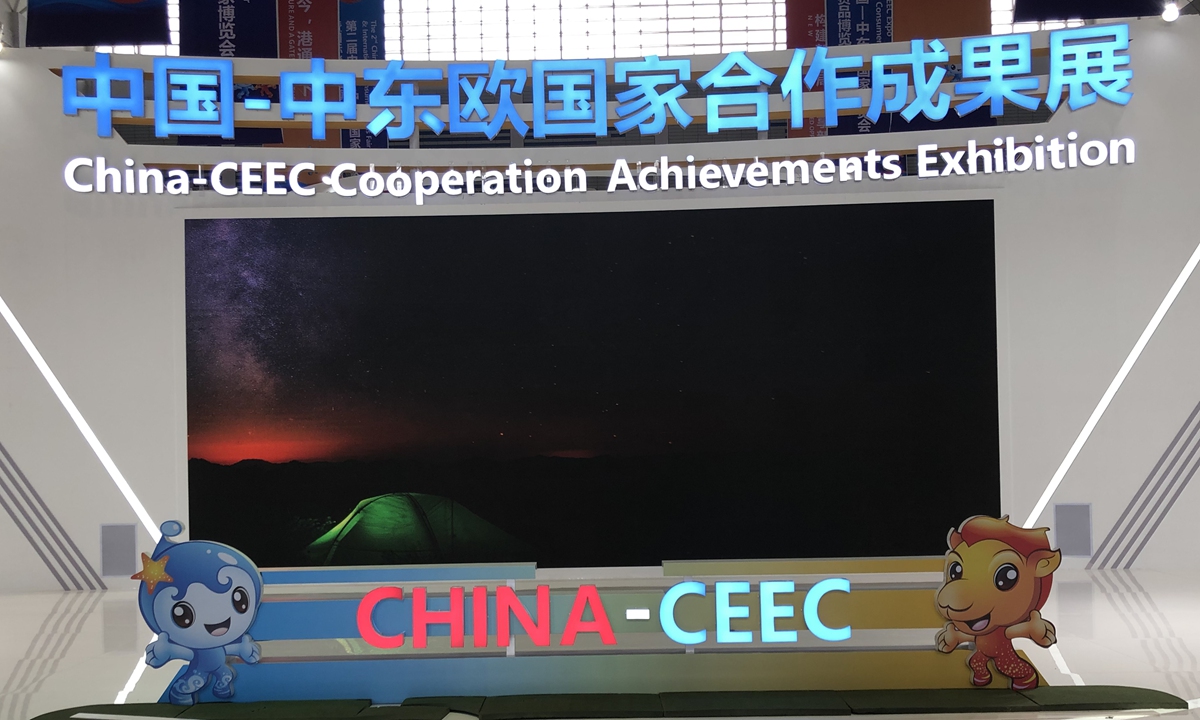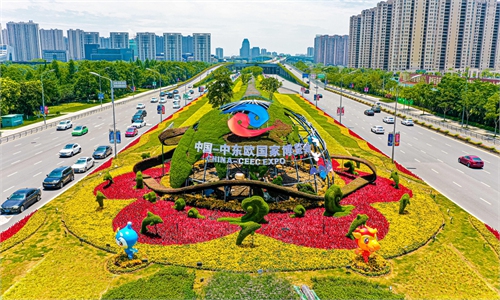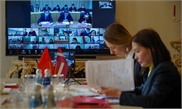China, CEECs ripe for co-development despite sporadic noise
Beijing a comprehensive and responsible partner in trade, business

Flowers are seen at the expo site of the second China-Central and Eastern European Countries (CEECs) Expo & International Consumer Goods Fair in Ningbo, East China's Zhejiang Province. Photo: Chu Daye/GT
With more than 2,000 exhibitors and 6,000 buyers expected to attend, the second China-Central and Eastern European Countries (CEECs) Expo and International Consumer Goods Fair will kick off on Tuesday, against the backdrop of some politicians' instigation of an anti-China roadshow, which experts described as an abortive attempt in the face of a rising trajectory of business and economic ties between China and CEECs.
The Global Times learned that Jinhua, a city in Zhejiang, launched a railway cargo freight train service to Budapest, Hungary on Monday ahead of the major trade expo.
The expo, which is expected to be held in East China's Ningbo, Zhejiang Province from Tuesday to Friday, was organized by the Chinese Ministry of Commerce and Zhejiang provincial government. More than 260 foreign representatives, institutions and businesses will attend the expo, including more than 40 ambassadors and consuls general.
The expo is designed to explore opportunities and boost trade in consumer goods and services with Central and Eastern European nations. Exporters and importers from China and CEECs in fields ranging from agriculture and machinery to equipment and auto manufacturing have shown interest in deepening cooperation through the event.
Wang Jian, an official from the commerce department of Zhejiang, said on Monday that the expo is the only national-level exhibition catering to CEECs, and has created a platform for cooperation between small-sized enterprises.
Official data obtained shows that from January to April 2021, Zhejiang's foreign trade has increased significantly, among which imports from 17 CEECs was 4.07 billion yuan ($636 million), a 117.2 percent increase.
"In the next five years, we will import $20 billion worth of goods from CEECs and double our agricultural imports… the expo is the best platform for Zhejiang to expand import procurement," Wang said, noting the province also seeks to strengthen cooperation with CEECs in science and technology, education, culture, tourism and sports.
Despite the considerable prospects for cooperation, the expo was marginally overshadowed by some CEECs politicians' anti-China comments amid political division within some CEEC countries which led to a tendency of politicization of cooperation with China.
Hungary used its veto power for the third time in two months to block the European Union from issuing the so-called Hong Kong-related statement on Friday; however, Budapest Mayor Gergely Karacsony made frequent anti-China noise against the building of a branch of China's Fudan University in Budapest, according to media reports.
Zhao Lijian, the spokesperson of the Chinese Foreign Ministry, said in late May that China firmly opposes Lithuania's gross interference in China's internal affairs, in response to the country's congress which said China is committing "genocide" against the Uygur minority and has called on China to repeal national security laws for Hong Kong.
Global Times found no exhibition stand of Lithuania in a pre-tour on Monday. The country has quit the China-led 17+1 mechanism due to what its officials called "less-than-expected benefits."
Despite the hiccup, an increasing number of European companies are eyeing the huge opportunity in trade and economic cooperation between China and CEECs. Leon Meredyk, manager of business development of Polish trading firm Vici Group that exported 2,200 containers of milk products to China in 2020, told the Global Times on Monday that more and more Polish firms are looking at the huge Chinese market as their future growth driver. "Having only made our entry into the Chinese market in 2013, the Chinese market now accounts for roughly half of our exports," Meredyk said. "Each year, we are looking at 100 percent annual growth."
Wang Yiwei, director of the Institute of European Studies at Renmin University of China, told the Global Times on Monday that many European countries are facing multiple challenges in terms of fighting the epidemic, economic recovery, and cutting carbon emissions. Addressing these challenges requires more investment and cooperation, and China can be a comprehensive and responsible partner.
Despite the political divisions within some countries and the highly politicized view of China-EU cooperation from some politicians, China should keep calm and adhere to the principle that China's cooperation framework is inclusive, open, transparent and of high standards, Wang said.
If the expo in Ningbo succeeds, then countries like Lithuania may be tempted again, and as this kind of cooperation grows, European politicians will think seriously about why they are being used by other countries against China, the expert said.
In February, China announced it would import more than $170 billion in goods from CEECs in the next five years.




